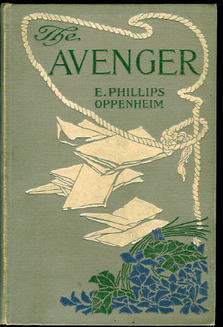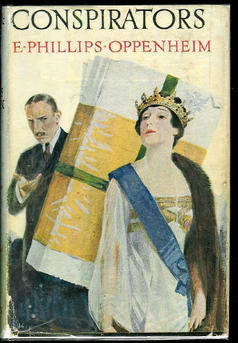
The Avenger is an enjoyable mix of elements popular in literature at the time, including international intrigue, mysterious murders, and headstrong damsels who still need some help from the men who fall in love with them to avoid scandal and social ruin. If the prose and dialogue are a little formal and genteel, they are also admirably accessible when contrasted with other fiction of the time. To my delight, I found Oppenheim’s storytelling engaging and his narrative pacing and structure worthy of a contemporary Hollywood screenwriter, which surely goes a long way to explain his popularity with readers.
Wrayson receives another jolt when a chance photograph reveals that the mysterious woman is Louise, daughter of his good club friend Colonel Fitzmaurice. Also at the club is a curious soul named Stephen Heneage, “a man of a different and more secretive type.” This sedentary acquaintance takes an interest in the case, even advising Wrayson at one point to leave the country or risk danger in London. Heeding this advice, Wrayson crosses the channel to France, where he meets The Baroness, whose companion is Louise. While The Baroness is thrilled with the company of the Englishman, Louise is much less enthused, and Herbert Wrayson has the double challenge of learning Louise’s involvement with the cab murder while also engaging in gentlemanly romantic pursuit.
The abrasive Sydney Barnes soon appears, hoping to discover the source of his dead brother’s substantial income in England, as he knows that Morris left Africa virtually penniless. Sydney tries to get an answer from solicitor Bentham, but the lawyer is not talking, and is soon found stabbed outside his office. Once again, Wrayson must determine Louise’s involvement and decide whether her life is also in jeopardy. Heneage continues to act cryptically, a ghost from the past resurfaces, and ultimately all is made known and reputations saved from ruin.

While it was an enjoyable reading experience, The Avenger ultimately – perhaps necessarily – rang a little hollow for me. As popular literature of another era, it lacks a larger thematic idea or purpose beyond upholding the social morality that its plotline explores. It also carries a symmetric neatness that feels a little too pat, a bit too diagrammed, which arguably is a weak case to make by a fan of classic detective fiction. But just as my favorite mystery stories and authors use the genre to provide something more in the way of character, theme, or structure, I hold the same hope regardless of the era or format I dip into. Oppenheim here delivers first-rate crime melodrama, which is cause for recognition if not complete devotion to explore his entire oeuvre of more than 150 books, short story collections, and plays. That said, I’m glad I read one engaging title from E. Phillips Oppenheim, and would not mind doing so again.
 RSS Feed
RSS Feed